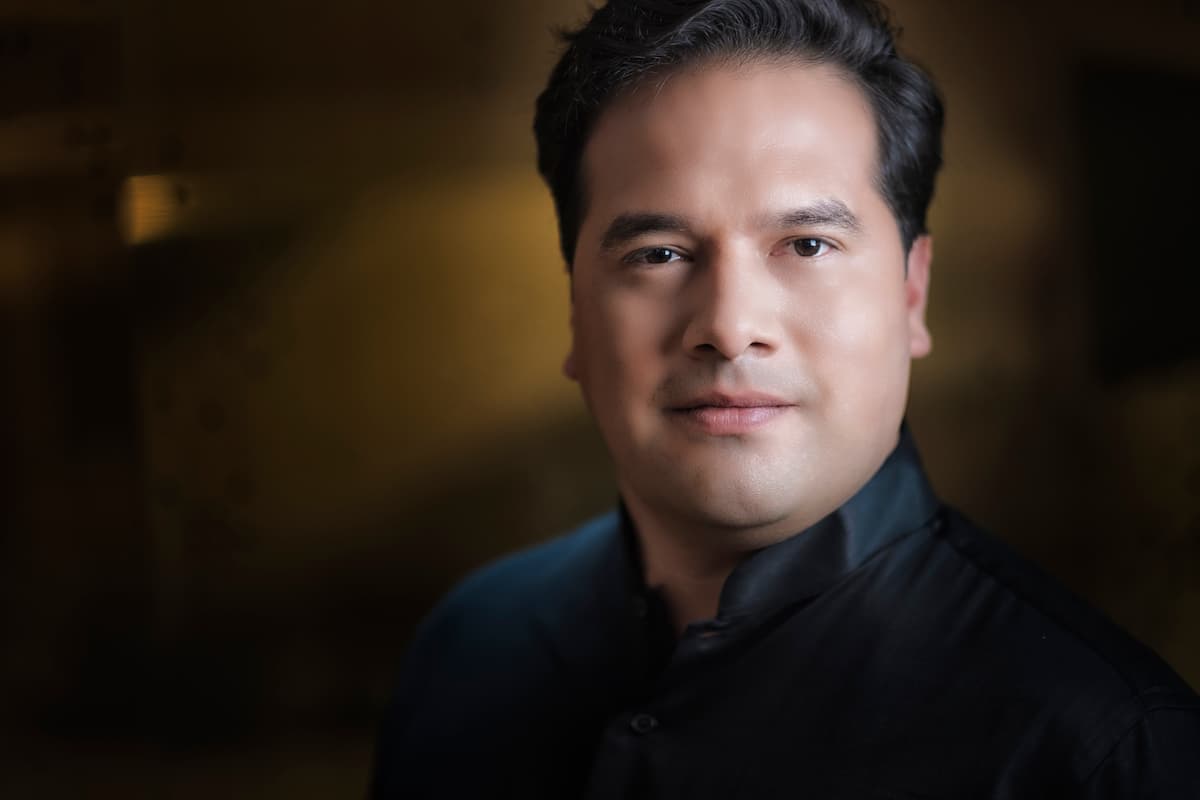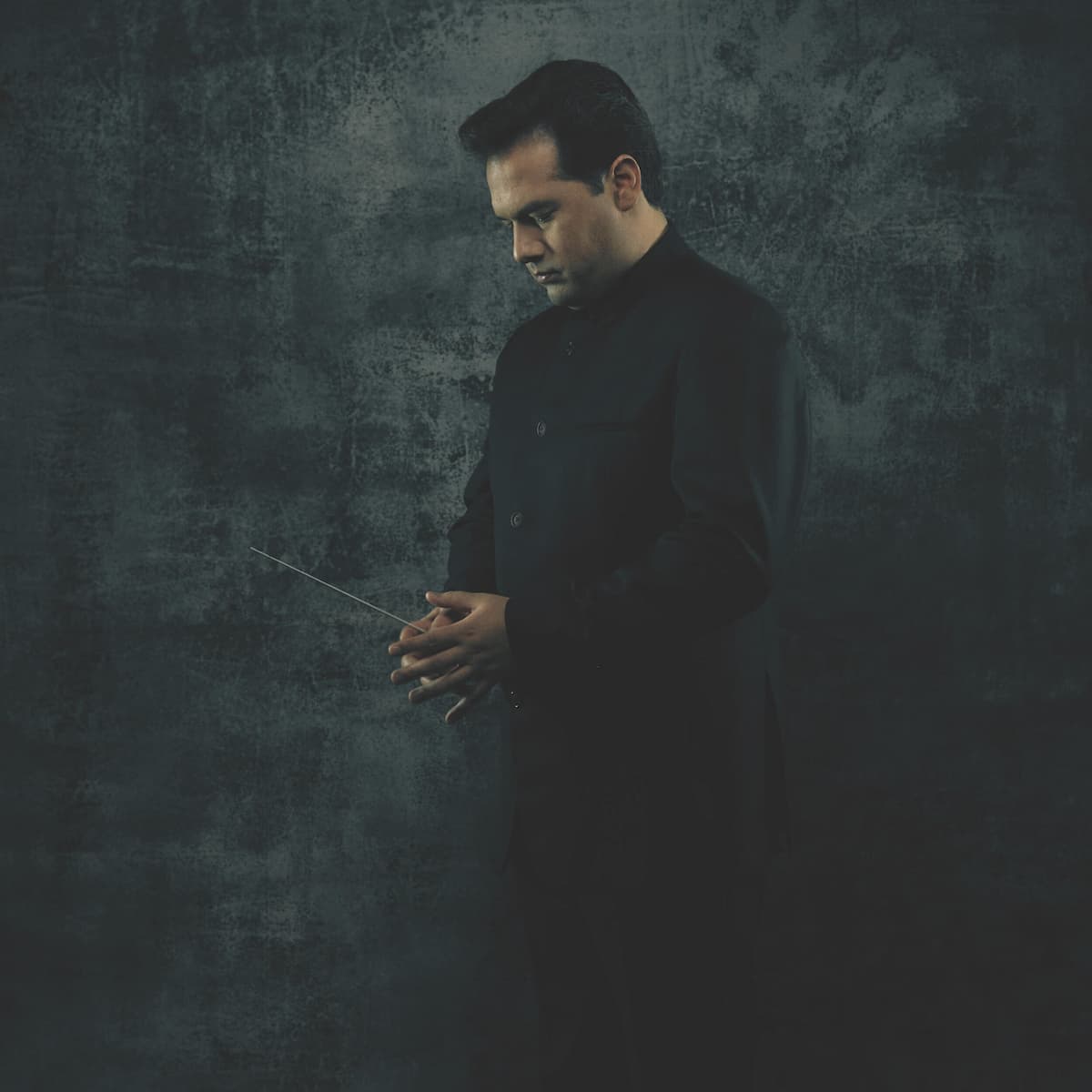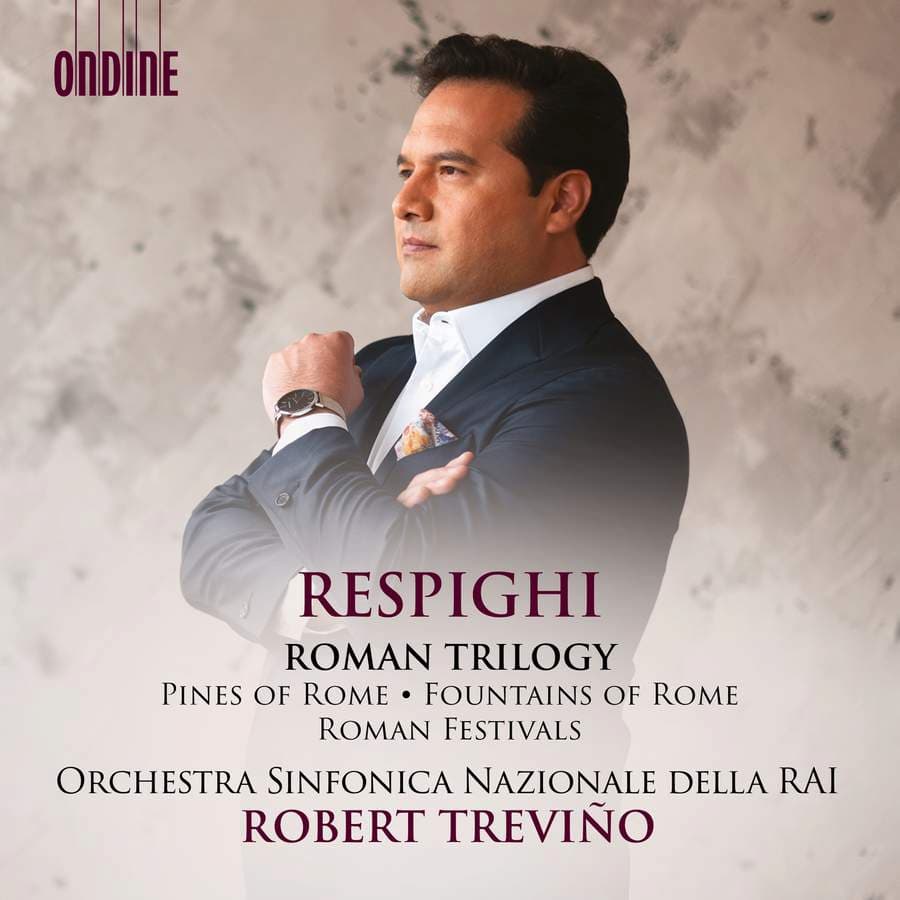Mexican-American conductor Robert Treviño has garnered international praise for his spirited stage presence and a slew of successful recordings. As well as being Principal Guest Conductor of the Orchestra Sinfonica Nazionale della RAI, Robert holds the position of Music Director with the Basque National Orchestra (BNO), with whom he recorded two albums of Ravel’s orchestral music, released on Ondine in 2019, and the much-praised album ‘Americascapes’ which was shortlisted for a Gramophone Award and named a ‘best recording of 2021’ by Presto Music.

Robert Treviño © Håkan Röjder
He has also recorded a complete cycle of Beethoven symphonies, and a survey of music by Finnish composer Einojuhani Rautavaara, both with the Malmö Symphony Orchestra where he was Chief Conductor.
Gramophone called him ‘a human dynamo…plug him into the grid and you could light up San Sebastián for a month’.
Edward Elgar: Symphony No.1 – Robert Treviño – Euskadiko Orkestra
For Robert, the Ravel recording project was a special opportunity to engage deeply with the composer: Ravel was born in the Basque Country, nestled between France and Spain, and it was an illuminating journey to discover more about his music through the eyes of the BNO.
His upcoming release this September features Respighi’s hugely popular Roman Trilogy (RESPIGHI, O.: Roman Trilogy), his first recording with the RAI Orchestra.
I talked to Robert just at the beginning of a well-deserved week off, about the imminent Respighi release as well as the process behind his successful Ravel albums, in addition to how he found his way to music via the passenger seat of a pickup truck in Texas.
How did you get involved with music?
I don’t come from a musical family. There was a lightbulb moment, for sure – actually, more of a lightning strike! I was eight years old and with my father, in his pickup truck, and we came across a classical music station on the radio, which I’d never heard before. I heard what I now know is Mozart’s Requiem, and I knew at that moment that whatever that was I was listening to, that’s what I had to do with my life.
When did you start to study music?
I didn’t get to start music until I was thirteen, but then I never stopped. From eight to thirteen, I was taking my allowance money to buy cassette tapes of the Beethoven symphonies and Mozart violin concertos.
Then when I was thirteen I was in public school and we had a music programme, so I was able to start music there, and then by the time a year and half went by I had an instrument in my hand and I started studying scores because I knew I wanted to be a conductor.
I’ve spent every waking hour of my life working since then – the better part of 25 years.
What was your instrument originally?

© robert-trevino.com
Most people don’t know that, but originally I played the bassoon. When I knew I wanted to be a conductor, I understood that if I wanted to be able to talk to an orchestra and tell them what to do I’d have to have a working knowledge of every instrument.
I learned to play the clarinet, timpani, xylophone, piano, cello, trombone, trumpet… I went through the whole orchestra, I took lessons on everything, I watched lessons to understand what the instruments can do.
When I conduct I’m not conducting the bassoons – I’m conducting an orchestra, and I’m able to talk to each group on its own level. A conductor should be able to deal with everybody.
Your two Ravel albums were recorded with the Basque National Orchestra. How was it to record so much of Ravel’s music who was born in this very region?
It’s very interesting. When I came to the Basque Country I thought it would be a nice opportunity for me to see their aesthetic on this type of music.
And it’s very funny: the Basque people slightly said, ‘Oh, you know, Ravel was Basque,’ but they sort of said it in this more passing way, not with so much pride, not such an ownership of the idea, and I thought, ‘That’s very strange – why is that?’
I started digging and talking to more people, and it turned out that because the French had just claimed him as their person [the Basque people] didn’t feel that they could also claim their patriot.
I thought that was very strange, and the more I did some studying and working with some colleagues here, finding out more about Ravel, how he wrote Bolero in St Jean-de-Luz [just down the road from where the BNO is based], I started thinking the Basque people could really claim him.
It’s interesting speaking to French Basque people about Ravel’s operas, and the language he uses. They’re all in French, but the way he writes and emphasises [the text] is very particular to the south of France, to the Basque region. It takes a high level of specialisation to notice these things – some of these things are really very minute, but they’re there all the same.
So I started to think, ‘Hey, maybe we could reclaim this guy, maybe there’s something to be said,’ because one of the things for me personally – perhaps controversially – is that I’ve never really bought this light, transparent, very very fine no-edge type of approach to Ravel. When I would look at his scores I would notice a lot of punch, a lot of nastiness, sarcasm. There’s some roughness, and also all the pieces that Ravel wrote are succinct, they’re right to the point.
Then I started noticing the similarities: Basque people are quite direct people, they’re not so effusive, and they can be people of many fewer words. And so a new, even more interesting sound started to emerge, knowing the aesthetic of the people here.
How did discovering more about the Basque culture feed into your work on the recordings?
At the beginning the orchestra wasn’t thinking anything of it – they were playing Ravel like Ravel. So I thought, ‘Let’s explore this, let’s see if we can claim something in a legitimate way, and also provide a new perspective on it.’ Not for the sake of ‘new’, but just to go deeper into the subject.
For me, out of all the things on both albums, the two things I’m most proud of are La Valse and Ma Mère L’Oye, because they are two completely different sides to Ravel’s ideas.
The first of the two albums are mainly more the ‘French’ Ravel, the second more the ‘Spanish’. The aesthetics were somewhat different, and in fact, I think I got a review where someone said ‘I really can’t stand Treviño’s La Valse, it’s too heavy, it’s too dark, it’s too brooding, but he really gets it right with the second disc – it’s much more light and beautiful.’
I get a little bit frustrated when people start approaching a composer in only one way. I think it’s disingenuous. Ravel absolutely has hardness to it. There are a lot of silent tears in his music. Debussy not so much. In Pelléas et Mélisande sure, but there’s not a single piece of Ravel that doesn’t have that sour note to it, that overt melancholy, and that’s something that has to be there.
Debussy is a composer of colours that become the ideas, and Ravel is a composer of ideas that have a lot of colours.
Your most recent release in September 2023 is an album of Respighi’s Roman Trilogy. What is your relationship to recording music that has already been recorded many times previously?

© Ondine
With all these standard repertoire pieces the bar is quite high. You have all the best conductors recording this stuff with the best orchestras, but I’m never deterred by that because I firmly believe that my opinion and my viewpoint is a valid one. I have to believe that or else I can’t do my job.
I remember when I recorded the Beethoven [symphony] cycle there were people saying, ‘Why does this 35-year-old think he’s ready to record Beethoven?’ And I said, ‘Well, because I think I have a perspective on it that’s valid.’ I’m not saying it’s going to be ‘the’ Beethoven, but I don’t think anybody agrees on what ‘the’ Beethoven cycle is.
The point is that this is living music that is constantly evolving, and constantly being reevaluated by the people who are alive now. That is part of the immortality of the composer: that living people are reviewing it, giving their life force and their life’s efforts to keep it going.
It’s only a point of greatness that a composer can [still] speak to a person in 2023. Since the 1770s the world has changed quite a lot, but the fact that we can still hear the second movement of Beethoven’s Third Symphony and cry and feel the tragedy, goes to the root, the profound humanism of these composers.
So if you really think it’s all been done already then we should just tie it up and close the orchestras down and stop playing those pieces. That’s what we should do because perfection has been achieved. If it’s been recorded, even better, because we’d have no more need for it.
It’s a little bit of an antiquated, pompous and pseudo-intellectual perspective of some people. And I call it right out to its face like that, and I say, ‘I’m sorry, I don’t care how many times you’ve reviewed a Beethoven cycle, your knowledge of the Beethoven symphonies is still a fraction of what mine is, because I’ve spent my whole life with the actual text, figuring out what’s going on here.
Respighi has been recorded numerous times, by great conductors, but I believe that there are a lot of things to be said about the pieces. One of the things I wanted to emphasise in this recording is not the bombastic, because I think that’s fairly easy to achieve.
I wanted to take time to look at Respighi’s music and his writing because it’s actually very subtle. There’s a lot of softness, nuance, and colour – I think people sometimes take too much of a brutal approach to his music, a little bit too much of a Hollywood cinematic idea. I wanted to get back to the basics, to look at the score, to get really deep, to work with the supposition that this is serious music of a serious person with serious talent who’s trying to say something very important.
How did it feel to delve into the details during the process?
I think something new has arrived. I was extremely detailed in all the little things – there are a lot of recordings that sound very good but that aren’t really accurate at all, and I wanted something that was beautifully accurate.
There are tiny little details that add an enormous amount of character to the music.
A mediocre reading of the piece without a lot of detail is so highly effective for an audience and successful, but then people come away with this impression that Respighi’s not really deep. They say, ‘Well, it’s something we really enjoy, but it’s not very deep,’ but when you get down to the details it’s exquisite music.
People like Mahler, Szymanowski, Strauss: the amount of detail and specificity in the score is enormous, and it’s usually just glazed over. The music can sustain that treatment – even Beethoven’s music can sustain that treatment – but then the detail is exquisite. Why would you not do a piece like that?
How are you planning to spend your week off?
As a working professional who travels a lot, the thing I desire most is time with my family. It’s not going to the beach and drinking piña coladas, it’s being with my family – that is special for me, that we have the time to do that for a week and not be disturbed or go to conduct a concert.
At the same time, I’m always working. It never really shuts off, but I like being able to have all my energy for time with my family, rather than share it.
For more of the best in classical music, sign up for our E-Newsletter




